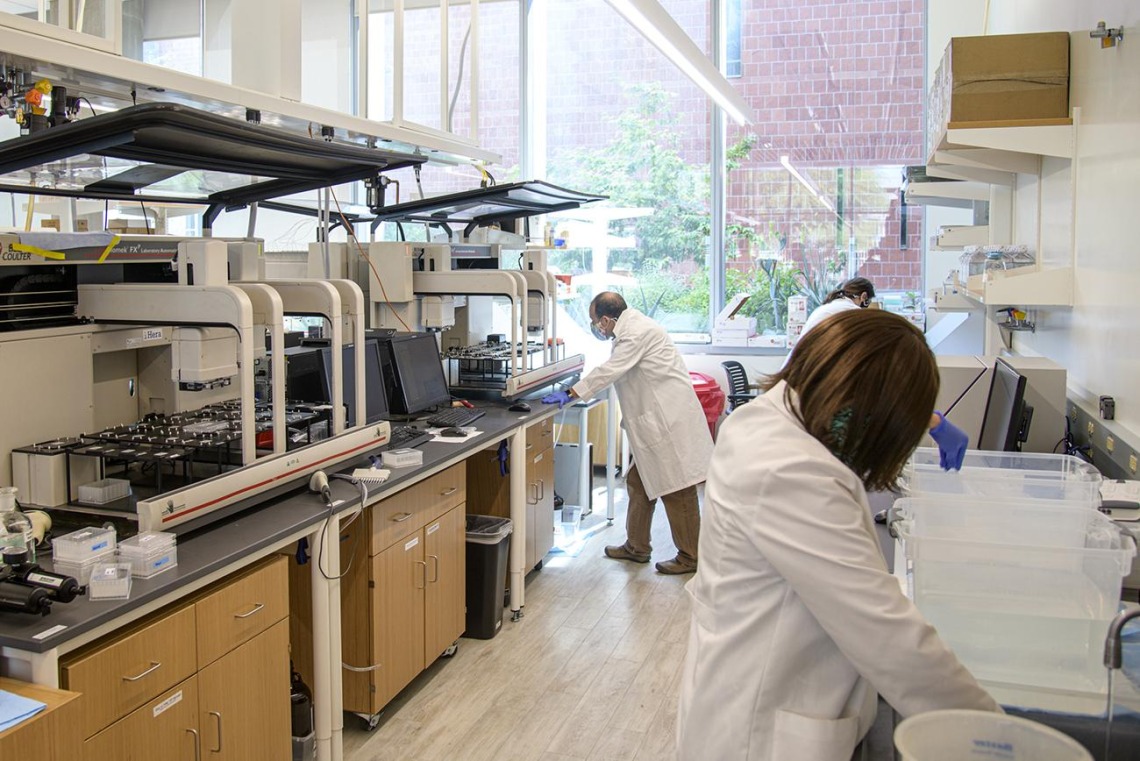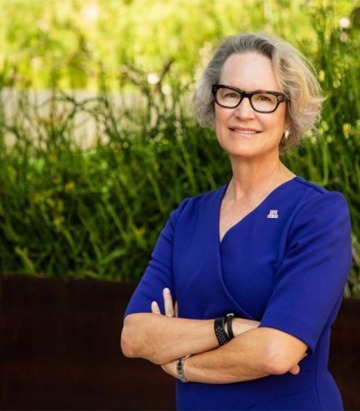University draws on its own expertise and experience to develop plans for resuming research

Researchers practice social distancing while processing COVID-19 antibody tests.

Elizabeth "Betsy" Cantwell, senior vice president for research and innovation
The University of Arizona is applying its own research expertise and experience to test safe practices in active laboratories as campus prepares to resume more in-person laboratory and field research this summer and in-person classes this fall.
Since March, Elizabeth "Betsy" Cantwell, senior vice president for research and innovation, has been touring campus research labs and facilities with approved waivers to operate during the COVID-19 pandemic and observing which safety practices are – and aren't – effective.
During an online Q&A with the campus community in May, Cantwell said she hopes some of the 200 labs that are operating under a waiver can help develop social distancing, disinfecting and other health best practices and guidelines for the 550 labs planning to reopen.
"We have a lot of experience with what safe operating parameters are," she said. "Over the summer, we would like to pilot some of the capacities we know we need to have fully operational in the fall, so we can get a sense of things that work well and, more importantly, how they work."
Keeping researchers healthy
Following a stay-at-home order issued by Gov. Doug Ducey on March 30, the Office for Research, Innovation & Impact issued guidance on temporarily shutting down all research activities except those approved as "essential" through a waiver process. Those labs and facilities that remained open were required to follow Centers for Disease Control and Prevention guidelines for social distancing amid the COVID-19 outbreak.
While guidelines from the CDC address person-to-person interactions, including those in labs, they do not address paving the way for lab work to resume now, Cantwell said.
"We're responsible for safe operation in our research facilities, our research programs and our labs," she said. "And that responsibility isn't one that the CDC guidelines say anything about."
On June 1, RII issued new guidance on a phased process for restarting research activities across campus in the coming weeks, with the health and safety of employees as a top priority. The team created a Research Restart Plan, a six-phase approach to restarting research on campus. The research phase the University is in at any given time will be determined by RII using a combination of factors that are evaluated by the Incident Command System Reentry Task Force. Currently, it stands at Research Phase 3 – marked by local COVID-19 hospitalizations flattening, and COVID-19 testing capacity increasing, among other variables.
Before research activities resume, researchers and colleges must complete and submit to their associate deans for research checklists designed to reduce the risk of exposure to COVID-19 and ensure a smooth reopening. Once approved by their units, checklists are sent to RII for final review. As of June 3, 70 checklists had been approved and more were in the pipeline.
During the online Q&A, Cantwell said she is inspired by what she has seen and learned through her lab tours.
"We're learning a lot about the incredible innovation of our research faculty in terms of making sure their facilities and their labs and the sites in which they do their research are in fact safe."
With each lab's permission, she and her team film video of their tours to document these creative approaches.
"We've seen really novel and just really clever approaches to disinfecting between people using a workbench, or creating standing locations that are far enough apart, or reorganizing so all of the equipment is in the middle and the operating spaces are around the outside, which creates kind of a natural barrier from one another," she said. "People are very clever. I'm just constantly delighted."
In addition to social distancing and disinfecting procedures, Cantwell hopes to see lab groups volunteer to pilot ways to check researchers' wellness. In May, her office issued a call for ideas or short-term collaborations designed to conduct research in real-time, as campus reopens. These efforts might include: methods for regular temperature monitoring to detect an early symptom of the virus that causes COVID-19; innovative contact tracing; routine testing for active infections or antibodies; and research on the social, economic and other impacts of closures and distancing.
Working groups for field research, students
Field research presents different challenges from those in labs, such as transporting a team of researchers to a field site (which might have previously meant carpooling in a van), interacting with community members, and traveling internationally for research. A specific team, headed by Jane Zavisca, associate dean for research and graduate studies in the College of Social and Behavioral Sciences, has formed to develop guidance for resuming fieldwork, Cantwell said.
It is likely that students also will return to labs in the summer, she said, urging researchers to ensure that "students at any level are comfortable operating in the facility that you've asked them to operate in."
A version of this story originally appeared on the Health Sciences Connect website.

